The Ten Oxherding Pictures of Zen: Series 1
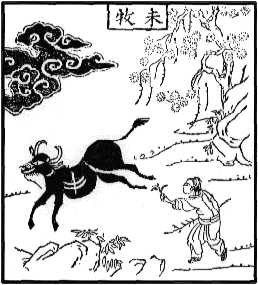 |
I. UndisciplinedWith his horns fiercely projected in the air the beast snorts, Madly running over the mountain paths, farther and farther he goes astray! A dark cloud is spread across the entrance of the valley, And who knows how much of the fine fresh herb is trampled under his wild hoofs!
|
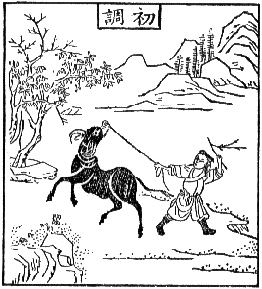 |
II. Discipline BegunI am in posession of a straw rope, and I pass it through his nose, For once he makes a frantic attempt to run away, but he is severely whipped and whipped; The beast resists the training with all the power there is in a nature wild and ungoverned, But the rustic oxherd never relaxes his pulling tother and ever-ready whip. |
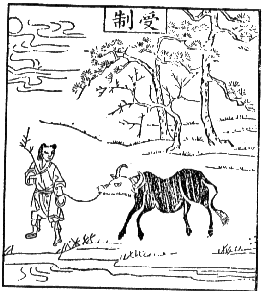 |
III. In HarnessGradually getting into harness the beast is now content to be led by the nose, Crossing the stream, walking along the mountain path, he follows every step of the leader; The leader holds the rope tightly in his hand never letting it go, All day long he is on the alert, almost unconscious of what fatigue is. |
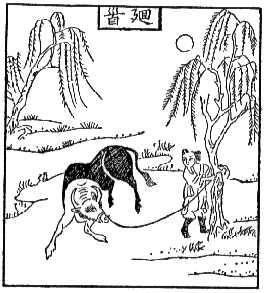 |
IV. Faced RoundAfter long days of training the result begins to tell and the beast is faced round, A nature so wild and ungoverned is finally broken, he has become gentler; But the tender has not yet given him his full confidence, He still keeps his straw rope with which the ox is now tied to a tree. |
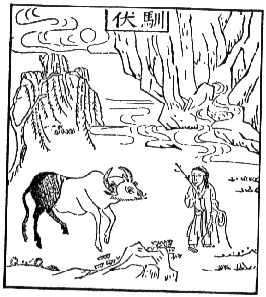 |
V. TamedUnder the green willow tree and by the ancient mountain stream, The ox is set at liberty to pursue his own pleasures; At the eventide when a grey mist descends on the pasture, The boy wends his homeward way with the animal quietly following. |
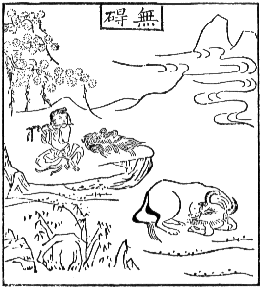 |
VI. UnimpededOn the verdant field the beast contentedly lies idling his time away, No whip is needed now, nor any kind of restraint; The boy too sits leisurely under the pine tree, Playing a tune of peace, overflowing with joy. |
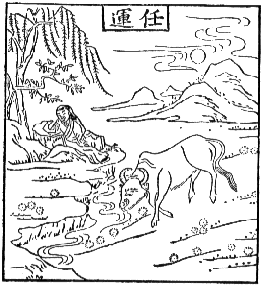 |
VII. Laissez FaireThe spring stream in the evening sun flows languidly along the willow-lined bank, In the hazy atmosphere the meadow grass is seen growing thick, When hungry he grazes, when thirsty he quaffs, as time sweetly slides, While the boy on the rock dozes for hours not noticing anything that goes on about him. |
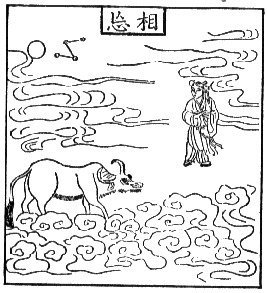 |
VIII. All ForgottenThe beast all in white now is surrounded by the white clouds, The man is perfectly at ease and care-free, so is his companion; The white clouds penetrated by the moon- light cast their white shadows below, The white clouds and the bright moon- light--each following it's course of movement. (note the constellation Lyra) |
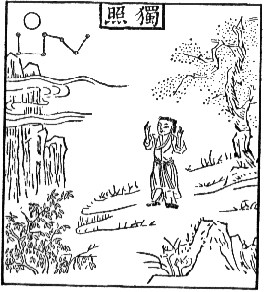 |
IX. The Solitary MoonNowhere is the beast, and the oxherd is master of his time, He is a solitary cloud wafting lightly along the mountain peaks; Clapping his hands he sings joyfully in the moon-light, But remember a last wall is still left barring his homeward walk. (note the constellation Aquila) |
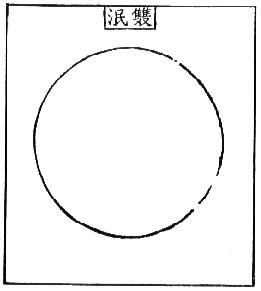 |
X. Both VanishedBoth the man and the animal have disappeared, no traces are left, The bright moon-light is empty and shadowless with all the ten- thousand objects in it; If anyone should ask the meaning of this, Behold the lilies of the field and its fresh sweet-scented verdure. |
